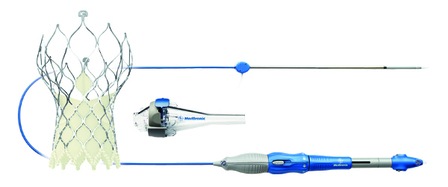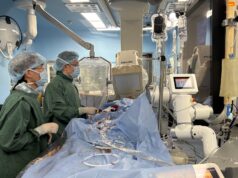
The first patients have been enrolled in the real-world Evolut R FORWARD clinical study of the CoreValve Evolut system (Medtronic).
The study, which will evaluate performance outcomes using the CoreValve Evolut in everyday clinical practice, is global, multi-centre, single-arm and prospective. It aims to enrol up to 1,000 patients.
Evolut R has shown the highest reported survival rate (93.3%) for high and extreme risk aortic stenosis patients at one-year follow-up according to data from the Evolut R CE Study, which was presented at the 2015 Transcatheter Cardiovascular Therapeutics (TCT) scientific symposium.
The first patients in the study of the next-generation, recapturable and repositionable transcatheter aortic valve implantation (TAVI) system were enrolled at University Hospital in Bonn, Germany, by Georg Nickenig and his team.
The study will enrol high- and extreme-risk patients in at least 60 centres worldwide, and will document the clinical and device performance outcomes of the Evolut R System used in routine clinical practice. The primary endpoint will evaluate all-cause mortality at 30 days post-implant in patients with severe symptomatic aortic valve stenosis. Secondary endpoints will include VARC-2 safety and efficacy. The study is designed to develop rigorous evidence through complete monitoring at all centres, leveraging an independent safety review and a core-lab adjudicated haemodynamic performance. Follow-up will be conducted at implant, 30-days, one-year, two-years and three-years post-implant.
“Evolut R has demonstrated some of the most promising clinical results of any TAVI valve in its pre-market trial, and we are excited to enrol our patients into this rigorous study to show that the same results can be delivered in a real world clinical setting,” says Eberhard Grube, director of the Structural Heart Program at University Hospital in Bonn, Germany, and co-principal investigator of the FORWARD study.
Built on the CoreValve System, which has been implanted in more than 100,000 patients in 60 countries, the CoreValve Evolut R is available in Europe and other countries that recognize the CE mark and was approved for commercial use in the United States in 2015. Geographies participating in the study include centres in Europe, Australia, the Middle East, Africa, Latin America and Canada.
Data from the Evolut R CE Study, which evaluated high- and extreme-risk patients with aortic stenosis, reported a one-year stroke rate at 3.4%, strong hemodynamic performance (single-digit gradients at one year), low rates of moderate or severe paravalvular leak (4.3% at one year), and low pacemaker implantation rate (15.2% at one year).










